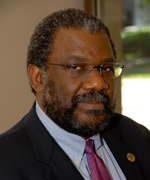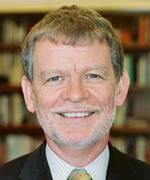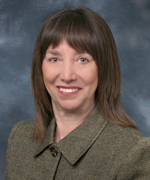Philanthropy On Trial
Tuesday, April 12, 12-1:30 p.m.
The Defendant: Philanthropy at large.
The Charge: Not fulfilling its mission of advancing the common good.
The Sentence if Found Guilty: Loss of specialized tax status.
Culminating the conference was Philanthropy on Trial, a courtroom "mockudrama" that sought to answer the question: Is philanthropy meeting its mission of fulfilling the public good? The stage was set with docks for judge, prosecutor, and defense attorney as theme music from televisionís "Law & Order" opened the proceedings.
Retired Pennsylvania Justice Jane Greenspan instructed Gara LaMarche, president and CEO of The Atlantic Philanthropies, to make the prosecutionís opening statement. In a stinging indictment and critique, LaMarche proclaimed philanthropy "a privilege, not a right." Although philanthropy has established many good things for society, he argued that the standard for the sector should be higher. The issue, he said, is whether tax deductions for the wealthy in the name of philanthropy are justified.
"Our sector has eroded its moral authority through self-interest," he explained. Citing last yearís debate over health-care reform, LaMarche said it was normal to expect lobbies to advocate for tax breaks for their clients, but "we needed guaranteed health care for all Americans, not further tax breaks for the rich."
And in the current quarrels over tax reform, he said it is "hard to find a voice in favor of the poor. We are failing the people we most need to stand behind." Finally, LaMarche noted that far too few foundations spend the bulk of their funds on eliminating poverty or environmental degradation. "When will this change?" he asked. "How long is too long?"
Ralph Smith, executive vice president of The Annie E. Casey Foundation, rose to the defense. He noted that philanthropists come in all political stripes. Libertarians who believe in the power of the free market sponsor groups they think have been marginalized. Those who promote social justice want people of color, women, the young, and the old to be treated as full citizens. Other philanthropies invest funds in the right of all people to marry. "This diversity of interest is the hallmark of philanthropy," Smith said.
Our case in defense of philanthropy "is not premised on the highest aspirations," he said, "but rather as a vehicle to persist on the transfer of wealth from private benefit to public good." He cited a litany of foundations and philanthropists who took great risks to solve seemingly intractable problems and advance causes and innovations that benefitted all of society: public libraries, Sesame Street, white lines on highways, rocket science, eradicating disease, promoting health, ending poverty, responding to disasters, preventing hunger, promoting justice, discouraging war, promoting peace. "We have been persistent and engaged, not missing in action," said Smith.
In rebuttal, LaMarche said Smithís arguments "amount to a greatest hit of philanthropy." Sure, we have made progress, LaMarche said, but the defense did not address his contention that philanthropy fails to advocate for the poor in our national conversations or acts in its self-interest in discussions of tax reform. For example, he cited a California billóopposed by the sectoróthat would have required philanthropies in the state to report how much they spent to benefit the poor. "That opposition strikes me as out of line," he said.
Smith said thereís no defense that philanthropy hasnít lived up to expectations, but he argued that the perfect is the enemy of the good. "Our job is to continue progress toward perfection, even if we cannot achieve it," he said.
In his closing arguments, LaMarche reiterated that institutional philanthropy is not the mainstay of giving in the United States and said that private giving will not suffer if tax deductions are capped. He urged jurors to "make a gesture" that says "we are not satisfied with our efforts. With no one else to hold us accountable, who will?"
Smith concluded by stating it is difficult to resist the urge to make a gesture but cautioned against "saying something that has no cost but perhaps has a hidden price." We have important work to do, he argued, "and this is no time for gestures. A not guilty verdict says we are prepared to act and respond to the call."
The bailiff explained that all audience members who had been given a ticket with the number 8 would comprise the jury. A group of four women and eight men filed out of the ballroom to deliberate as those who remained and those watching a live stream posted messages to Facebook or tweeted their reactions.
Discussion between the audience and the attorneys continued until the jurors returned. The bailiff announced the verdict to the hushed audience: "Hung jury!" This was followed by an audible gasp, then a poll of the jurors. One by one, the first 10 called "Guilty" until the remaining two demurred. Afterward, the judge said she didnít have the heart to tell the audience that a hung jury can occur only in a criminal trial.
For the Defense:
Ralph R. SmithOpening Remarks

For the Prosecution:
Gara LaMarcheOpening Remarks

Judge:
Honorable Jane Cutler Greenspan
